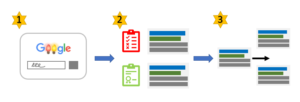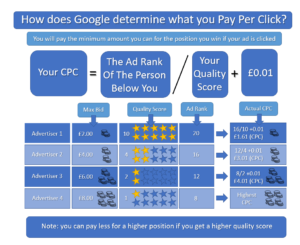How Do PPC Auctions Work – A Beginner’s Guide

PPC Auctions: Have you Ever Wanted to Know How Google Ads PPC Auctions Work? – If so this Beginner’s guide is for you!
In this beginner’s guide, we will cover how PPC auctions work, how Google decides which Google Ads are displayed where and how much they cost.
How do PPC Auctions Work?
When someone inputs a Google search, an auction is the process in which Google decides the ads that will appear on the results page and what order they will be in. Every time a Google Ad matches a search term it will go through an auction. This auction is used to determine whether the ad will show on the results page and the ad position. Note: The search engine must deem the query to have commercial intent (the user is searching for a service or product). If there is no commercial intent, ads will not show at all.
The Auction Process:
·. These are usually Google ads that target different countries or have some kind of policy violation.
· We are then left with a list of ads that Google sorts using Ad Rank, (we will cover this later). Only those with a high Ad Rank will show up on the search. Google will also determine in which order these eligible ads will appear on the page using a combination of ad relevance factors.
· The auction process is then repeated with every Google search, meaning that the positions of ads will fluctuate, depending on how competitive the auction is.
Bids: To enter a PPC auction, you must submit a bid. This bid determines how much you are willing to pay for each person that clicks on your ad, otherwise known as PPC or Pay per click. When setting a bid, you can cap the cost using a Max CPC or maximum cost per click. You can set a bid for one specific keyword or a group of related keywords (ad group level). The amount you are willing to pay for your bid is a factor used by Google when deciding whether your ads will show in a search.
Ad Relevance Factors: The search engine will aim to show ads that will make the user want to click on them. If the ads are not in line with a user’s search query, advertisers and the search engine will miss out on revenue. Therefore, Google uses a combination of ad relevance factors to calculate the overall Ad Rank of a Google ad. The calculation: Max CPC X Quality Score = Ad Rank. This will determine where an ad will show on the page. Let’s firstly take a closer look at Quality Score.
What is Quality Score?
Quality Score defines how relevant the ad is to the user. It is a main factor in deciding the ad position on the page and determines how much the CPC or Cost Per Click will be. Google displays quality score in Google Ads, scoring it from 1 (worst) to 10 (best).
Google analyses three key areas when calculating Quality Score:
1. Landing Page Experience
When a user clicks on a Google ad, they are taken to a landing page. The landing page experience is how relevant the landing page is to the ad and if it provides a good user experience.
2. Expected click through rate (CTR)
This is the estimated number of times an ad will be clicked on.
3. How relevant the ad is to the query
The content of the ad should directly correlate with the search query – it should answer the user’s questions or provide them with the information they have asked for.
How Quality Score is weighted by each key area
Google does not publish the exact Quality Score of ads to advertisers, however they have recently started explaining how they work out the final score.
It is estimated that:
· Landing page experience makes up 39%
· Expected CTR is 39%
· Ad Relevance is 22%
From here, advertisers can assess which areas to improve, which will then have an impact on a Google ads quality score. It makes sense to firstly look at increasing the expected CTR and improving landing page experience first, then focusing on refining ad relevance.
What about Ad Rank?
As mentioned above, Ad Rank is calculated using: Max CPC X Quality Score = Ad Rank. It is a combination of your bid, the quality of the ad, the relevancy to the search query, the Ad Rank thresholds, plus any expected impact of extensions of other ad formats.
Ultimately, Ad Rank is used by Google to work out where an ad will show on the page. The higher the Ad Rank, higher the position on the page.
What is CPC and how is it calculated?
CPC stands for Cost Per Click, which is the amount the advertiser pays each time a user clicks on their ad. The Max CPC is the bid that an advertiser submits to be entered into the PPC auction. CPC is worked out using:
CPC = The Ad Rank of Advertiser Below/Quality Score + £0.01
In the auction, the CPC is worked out using the Ad Rank of the next competitor, which means that prices can vary widely.
However, even if your competition ends up bidding higher than you, you can still gain a higher position on the page, for a lower price, by crafted ads that are highly relevant keywords and ads.
At PPC Geeks, we offer a FREE comprehensive Google ads audit that can help your business stay ahead of your competitors. Do not hesitate to ask us your questions such as: What is PPC and how does it work? Check out our FREE Google Ads Audit, or our FREE PPC Ads Audit today! Get in touch with a member of our team.
Author
Search Blog
Free PPC Audit
Subscribe to our Newsletter
The Voices of Our Success: Your Words, Our Pride
Don't just take our word for it. With over 100+ five-star reviews, we let our work-and our satisfied clients-speak for us.
"We have been working with PPC Geeks for around 6 months and have found Mark and the team to be very impressive. Having worked with a few companies in this and similar sectors, I rate PPC Geeks as the strongest I have come across. They have taken time to understand our business, our market and competitors and supported us to devise a strategy to generate business. I value the expertise Mark and his team provide and trust them to make the best recommendations for the long-term."
~ Just Go, Alasdair Anderson


